7Aunit4备课教案
7A unit4(Grammar B,C) 教学案
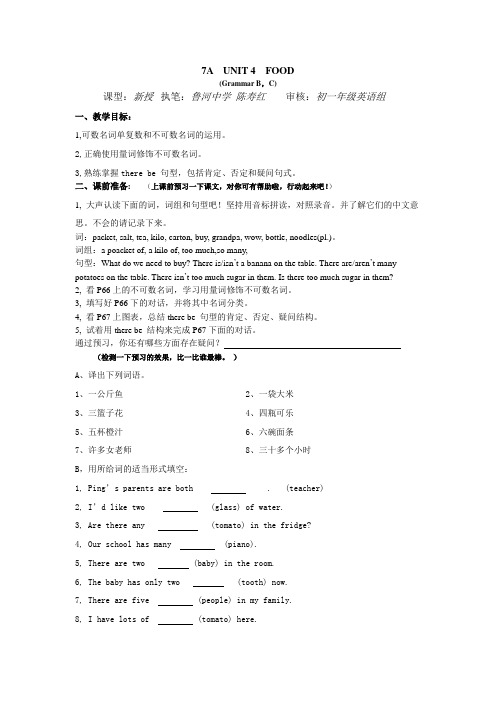
7A UNIT 4 FOOD(Grammar B,C)课型:新授执笔:鲁河中学陈寿红审核:初一年级英语组一、教学目标:1,可数名词单复数和不可数名词的运用。
2,正确使用量词修饰不可数名词。
3,熟练掌握there be 句型,包括肯定、否定和疑问句式。
二、课前准备: (上课前预习一下课文,对你可有帮助啦,行动起来吧!)1, 大声认读下面的词,词组和句型吧!坚持用音标拼读,对照录音。
并了解它们的中文意思。
不会的请记录下来。
词:packet, salt, tea, kilo, carton, buy, grandpa, wow, bottle, noodles(pl.)。
词组:a poacket of, a kilo of, too much,so many,句型:What do we need to buy? There is/isn’t a banana on the table. There are/aren’t many potatoes on the table. There isn’t too much sugar in them. Is there too much sugar in them?2, 看P66上的不可数名词,学习用量词修饰不可数名词。
3, 填写好P66下的对话,并将其中名词分类。
4, 看P67上图表,总结there be 句型的肯定、否定、疑问结构。
5, 试着用there be 结构来完成P67下面的对话。
通过预习,你还有哪些方面存在疑问?(检测一下预习的效果,比一比谁最棒。
)A、译出下列词语。
1、一公斤鱼2、一袋大米3、三篮子花4、四瓶可乐5、五杯橙汁6、六碗面条7、许多女老师 8、三十多个小时B,用所给词的适当形式填空:1, Ping’s parents are both . (teacher)2, I’d like two (glass) of water.3, Are there any (tomato) in the fridge?4, Our school has many (piano).5, There are two (baby) in the room.6, The baby has only two (tooth) now.7, There are five (people) in my family.8, I have lots of (tomato) here.9, The (child) are playing games on the playground now.10, They are (woman) (doctor).三、知识链接:1, 用量词修饰不可数名词: two glasses of water,two glasses of juice, a piece of bread, two pieces of paper,five kilos of chicken, a can of Coke……量词有单复数变化。
(完整word)7A_Unit4__My_day教案
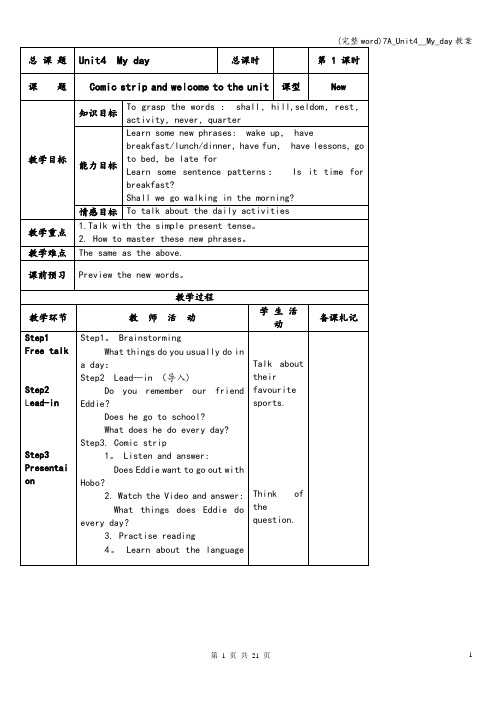
Talk about the students` school life
Do the introduction.
Ask and answer
Role play
教学反思
总 课 题
Unit4 My day
总课时
第3课时
课 题
Reading(2)
课型
New
Does he go to school?
What does he do every day?
Step3. Comic strip
1。 Listen and answer:
Does Eddie want to go out with Hobo?
2. Watch the Video and answer:
3)。 English is Millie’s favourite subject。
4). Millie seldom chats with her friends after class.
5). Millie only goes to the Reading Club on Tuesday.
6)。 Millie is a member of the school swimming team。
情感目标
Through the study on the expression of school life, cultivate the students' love learning and take good care of the school emotion。
教学重点
To be able to use English to talk about school activities
7Aunit4教案

初一年级英语学科教课设计总课题课题教课目的教课要点教课难点课前预习教课过程教课环节Step1 CheckStep2 Presentation Unit4 My day总课时7第1课时Comic strip & Welcome to the unit课型NewMake Ss grasp the new words and phrases: wake up,知识目标seldom, go out, have fun, have lessons, activity, never, be late for, start, quarter, past能力目标Enable Ss to talk about their daily activities and theirschool life感情目标Cultivate Ss’ability of arranging their daily life and theirlove for school lifeTalk about their daily activities in English.Talk about their daily activities in English.Preview the new words.教师活动学生活动复备Check answers of learning Check theirpaper.answers.T: What time do you get up/have breakfast/ go to school/have lessons/ go home every Talk freely with theday teacher.Show some pictures of clock.Ask: What time is itIt ’s o’clock.It ’s time for ..It ’s time to do ..Write the sentence on theblackboard.Step3 Practice Make up a dialogue likemodel:What time doyou .every day How long Work in pairs. does it take What about youFinish PartA on 43.Step 4 PresentationStep5 PracticeStep6 Presentation Show the four pictures of Listen to the tape comic strip. and answer Do you remember our friend questions.Eddie Does he go to schoolWhat does he do every dayLet’s listen to the tape andanswer the two questions.Ask Ss to read the dialogue Read and role play. after the tape.Then ask them to read it inroles and ask some of them toact it out.Millie is telling her aunt about Listen and answer. her school life. Listen to theirconversation and do some T/Flie goes toschool at 8:00. (F) They startlessons at a quarter pasteight. (T) Millie enjoys schoollife very much. (T)Step7 PracticeStep8 ConsolidationStep10 Homework Ask Ss to make up a dialogue Work in pairs and like the model.act it out.Consolidate what they have Do exercises and learnt in class.check one by one.Finish the exercises in theworkbook.Do homework. Remember useful expressions.教课反省总课题课题教课目的教课要点教课难点课前预习教课过程教课环节Unit4 My day总课时7第2课时Reading1课型NewVocabulary: chat, first, each, other, practice, wish知识目标Phrases: in the morning/afternoon/evening, each other,have a good time, best wishesTo enable students to get the general idea of Millie ’s 能力目标e-mail.To compare with Millie s ’school life and love their own 感情目标schools and school life.Master the way of describing the school life.Master the way of describing the school life.Preview the new words.教师活动学生活动复备Step1 1. Revise words and expressions Have a dictation. Revision on Page 42-43 and have adictation.2. Check learning paper.Step2The teacher introduce own dailyPresentation activities. From Monday ToFriday. I m never’ late for school.Learn new wordsIn the morning I usually clean my and phrases.office first. After school, I like todo after-school activities withmy students. Sometimes I chatwith them. They tell me lots ofinteresting things. All of us havea good time at our school.What about you, boys and girlsStep3Pre-reading:Read it fast and Reading Go through the e-mail quickly find out the and finish part B1 on page 45.answer.While-reading:Read the e-mail carefully and dosome T/F questions on page 45.Read and finishRead the e-mail after the tape some tasks.sentence by sentence and thenfill in the blanks of B3.Post-reading:Talk about Millie ’s activities in Work in groupsthe school:and then show. Do morning exercises out.Have lessonsChat with friendsPlay in the play groundGo to the libraryRead books in the Reading ClubPlay volleyballStep4Let one of the students act theHave an role of Millie. The other students Practice in English. interview can ask any question about herschool. Eg: How many clubs doyou have in your school How doyou go to school every dayWhere do you have lunchStep5Do some exercises to Do exercises. Consolidatio consolidaten what they have learned in thisclass.Step6Homework Finish some exercises in the Do homework.workbook.Try to retell the passage.教课反省总课题课题教课目的教课要点教课难点课前预习教课过程教课环节Unit4 My day总课时7第 3课时Reading2课型New知识目标To enable students to master some important words &expressions.能力目标To enable students to recite the whole text.感情目标Cultivate Ss’ lovefor their school lifeTo master the usage of language points.To master the usage of language points.Read and try to retell.教师活动学生活动复备Step1Revise some useful Have a dictation Revision expressions and have adictation.Step2Show some pictures of Millie ’s Read and speak. Retelling school life and ask Ss toarrange the pictures in thetime order.Step3Picture1:Language The school library is open frompoints9 in the morning to 9 in the Listen to theafternoon.teacher carefullyPicture2:and take someSome students chat with each notes if necessary.other under the tree.Ask: Do you like chatting withfriends WhyPicture3:Students have a good time inthe playground.Picture4:Millie is the best student in herclass.Ask: Who is the best student inyour class WhyWhat do you need to learnfrom him/herPicture5:Today is Teachers’Day. Bestwishes for the teachers.Picture6:A girl practice after schoolevery day. Practice doing sth.Let students say more phraseslike this.Step4Ask: Do you think Millie ’s Say something Showing school life is interesting What about their schoolabout your school life Can you life.say something about your dayLet Ss look at some notes andwrite about their day. Thenintroduce their own day to thewhole class.Step5Consolidate what they have Do exercises. Exercise learnt in class.Step6Recite the whole text.Homework Remember the words and Do homeworkphrases.Prepare for the next period.教课反省总课题Unit4 My day总课时7第4课时课题Grammar课型New知识目标教课目的能力目标感情目标students to use correct prepositions to express the time, week, month and seasonSs know usage of the adverbs of frequency能初步掌握介词 at ,on, in 表达时间的用法及在不一样社交情形中的运用功能。
7A Unit4 My day 教案

7A Unit 4 My dayTeaching Contents:Comic strip and welcome to the unit Teaching aims1.Learn to talk about daily activities in English2.Learn the new wordsTeaching Difficulties:Introduce daily activities in EnglishTeaching Aids: CAI pitures recorderTeaching Methods:1. Communicative teaching method2. “Task-based” teaching methodTeaching procedures:Step 1. Lead-in1.What time do you usually get up?2.When do you go to school every day?Step 2. PresentationLearn some new words•wake up 醒来seldom adv. 很少need vt&n需要have fun 玩得高兴•activity 活动homewok 家庭作业usually adv. 通常start vt&vi开始•quarter n.四分之一past perp.经过never adv.从不be late for 迟到Step 3 Look and answerWhat is Eddie doing?Step 4 Listen and anwer1 .What is Hobo doing?2. What does Eddie do after breakfast?3. What does he do after lunch?4. What does he do after lunch?Step 5 Read and actFree Talk:Do you want to be a lazy student?Step 6 Ask and answer1.What do we often do at school?2.What do we do at home?do morning exercises have lessonsdo after-school activities get upeat breakfast/lunch/supper go to beddo homework watch TVStep 7 Look at Millie’s dailyStep 8 Let’s have a talk-- What time does Millie get up?-- She _____________________-- What does she do at 7.30 a.m.?-- She _____________________Step 9.Talk about your daily activities:1.Finish the form on page 43.2.Try to say something about your own daily activities like that:Hi, I’m _______. I’m _____ years old. I study at _______________. I __________. In the morning, I ____________________Step 10.Listen and answer1.When does Millie go to school every day?2..What time does Millie start lessons every day?Step 11.Read and actStep nguage pointsStep 13.Exercises:1.翻译下列词组2.用所给词的适当形式填空3.选词填空4.完成下列句子Homework1. Act the conversation in pairs after class.2. Preview the new words in Reading.Teaching Contents:ReadingTeaching aims:1. Identify specific information about school life and activities2. Practise reading skills by learning Millie’s article.3.Learn the new wordsTeaching Difficulties:dentify specific information about school life and activities Teaching Aids: CAI pitures recorderTeaching Methods:1. Communicative teaching method2. “Task-based” teaching methodTeaching procedures:Step 1 Lead-inA story about FrankStep 2. Discussion1.Do you like your school?2.What do you think of your school life?3.What do you often do at school?Step 3.Talk about your school life1. What do you think of your school?2. When does your school day start?3. Do you do morning exercises at school? When?4. When do you begin your lessons?5. What are your favourite lessons?6. What is your favourite sport?Step 4.Read and learn some new wordsin the morning/afternoon/evening 在上午/下午/晚上favourite adj.最喜爱的from…to… 从…到…first adv. 首先chat vi.聊天practise vt/vi练习have a good time 玩得高兴best a dj./ad v. 最好的wish n.祝愿Step 5.Read and answerWhich is Millie’s favourite subject?Step 6 Finish B1 and B2 then check answersStep 7 Read after the tape then finish more exercisesStep 8 Finish B3 and C then check answersStep 9 Phrases and language points in the articleStep 10TaskRetell Millie’s school lifeStep 11 Interview then give a short speechbe a student at, start , from…to…, do morning exercises, lessons begin, favourite subject, be good atfriends, be nice to, chat withlibrary, a Reading Club, read books, like playing volleyball , be in,have a good timeStep 12 HomeworkWrite about your school lifeTeaching Contents:GrammarTeaching Aims:.Learn the use of prepositions of time and adverbs of frequencyTeaching Difficulties:Learn the use of prepositions of time and adverbs of frequencyTeaching Aids: CAI pitures recorderTeaching Methods:1. Communicative teaching method2. “Task-based” teaching methodTeaching procedures:Step1 Lead-inIt is very cold in winterChildren’s Day is on June 1st.They do morning exercises a t 8 o’clockStep2 Present the use of preposition of timeWe use in before parts of the day、months 、seasons、years.We use on before days、dates 、special holidays、parts of a special day.We use at before time of day、age.Step3 Explan the use of preposition of timein 用于泛指一天的各个部分,月份,季节及年份on用于表示具体的某一天at用于表示具体钟表上的时间、年龄Step4 ExercisesFinish the exercises on page 47 then check answers.Fill in the blanks with in、on、atStep5 Present the adverb of frequencynever 、seldom 、sometimes 、often 、usually 、alwaysStep6 Look at the pictures and fill in the blanks.频率由高到低为always usually often sometimes seldom never Step7 Complete the exercises on page 48 then check answers.Step8 Work in pairs and talk about your diets.•What do you have for breakfast/ lunch/ dinner?•I always/ usually/ often/ sometimes/ seldom/ never have…for my breakfast/ lunch/ dinner.•Do you always/ usually/ often/ sometimes/ seldom/ never have… for…?•What about you?Step9 Finish more exercises一根据首字母及句意思补全单词二对画线部分提问三比较下列句子Step10 Homework1. Remember the new words in this lesson.2. Finish all the exercises about grammar.Teaching Contents:Integrated skillsTeaching aims1.Learn some phrases: a little busy ,Sports Center, come and watch the game , visit the museum, once a week, go on picnics.2. .Learn some sentences patterns:I hope everyone can come and watch the game. Wish our team good luck ! How often do you go on a picnic.3. Try to listen and finish the table.4. Try to talk about a volleyball match.Teaching difficulties:1.How to improve the students listening abilities.2. Try to talk about the weekendsTeaching aids: Tape,. Tape recorder. . Some pictures.Teaching Methods:1. Communicative teaching method2. “Task-based” teaching methodTeaching procedures:Step One presentationShow some pictures about sports activities in our school,What kind of activity is this? Which activity do you like best? How often do you practice it? You practice it once a week.Why do you like this kind of activity? You practice it everyday.I wish you the best.T: Do you have a football/basketball/volleyball/table tennis match in your school?Does your team often win? I wish your team good luck!Step Two Listeninglie is talking with Simon about a volleyball match .listen to their conversation.Tick the correct answer to each question.2.Listen to the dialogue and answer questions.(1) Where do they have the match?(2) How often do they have this kind of match?3.Make a survey.My school activities4.Make up your new dialogue according to the table above.A: . B:A: . B:A: . B:A: . B:Step Three Part A2Simon is making notes about the volleyball match .let us listen to the conversation again and help him complete the notes in part A2. Then check the answers.Step Four Part A3Simon wants to write a note about the volleyball match to his classmates .Would you please help him complete it?Finish it.Then check it .A Speak upsk students to read it.Step Five Speak up1.presentationT:Do you think the volleyball match is intresting ? :Do you have a volleyball match at school? Where do you often have the match? When do you often have the match ? At weekends or weekdays?T:What do you like to do at weekends? Have a match ,see a film or visit a museum? How often do you do that?2.Show “Speak up”T:Millie is chatting online with Tommy about their weekend.Please listen to their conversation and answer this questions :What does Tommy often do at weekend?Listen to the tapeStep Six PracticeListen to the tape again and again.Then read it many times unit reciting .Act it out.T:Would you like to introduce you weekend activities ? Pleasework in pairs and make new conversations.Sample conversations.S1:What do you like to do at the weekend ?S2:I like to see films with my parents.S1:How often you see a film .S2: About twice a month. What about you?S1: I like to watch TV.S2:Do you often watch TV.S1: Of course not .Sometime I play football with your friends.S2: That is great.Step Seven Homework1 记忆本课所学词汇,短语和句型。
牛津译林版英语7AUnit4Grammar优秀教学案例

1.学生能够掌握一般现在时态的构成(主语+动词原形),理解其用法和辨析。
2.学生能够运用一般现在时态描述自己的日常活动和他人的一般特征。
3.学生能够理解一般现在时态的概念,并在实际情景中进行交际。
(二)过程与方法
1.通过任务型教学法,让学生在真实情境中感知和理解一般现在时态的构成和用法。
在教学过程中,我采用了任务型教学法,以学生为主体,注重培养学生的口语表达能力和思维能力。在导入环节,我通过展示图片和提问的方式激发学生的兴趣,引导学生思考和讨论。在呈现环节,我使用多媒体课件和实物展示一般现在时态的构成和用法,让学生在真实情境中感知和理解一般现在时态。在练习环节,我设计了一系列口语和书面任务,让学生在实践中运用一般现在时态,巩固所学知识。在反馈环节,我及时给予学生评价和反馈,鼓励他们积极参与课堂活动,提高他们的自信心。
4.反思与评价注重反馈:教师引导学生对课堂教学进行反思,总结自己在学习过程中的收获和不足,明确下一步的学习目标。同时,教师对学生的学习成果进行评价,关注学生的知识掌握和能力提高,给予合理的反馈和建议。通过反思与评价,学生能够更好地了解自己的学习状况,提高学习效果。
5.教学策略灵活多样:教师在教学过程中运用了情景创设、问题导向、小组合作等多种教学策略,使课堂变得生动有趣,激发了学生的学习兴趣和积极性。同时,教师注重培养学生的口语表达能力和思维能力,提高了学生的学习效果。
3.引导学生认识到学习英语的重要性,提高他们的语言素养。
4.培养学生关心他人,善于观察和思考的能力,培养他们的责任感。
作为一名特级教师,我深知教学目标的重要性,它不仅是教学活动的出发点和归宿,也是评价教学效果的重要依据。在制定教学目标时,我注重将知识与技能、过程与方法、情感态度与价值观三者相互融合,形成一个全面、立体的教学目标体系。通过这样的教学目标,我希望能够激发学生的学习兴趣,培养他们的自信心和团队合作精神,使他们能够在掌握一般现在时态的语法知识的同时,提高他们的口语表达能力和思维能力。同时,我也希望通过教学,让学生认识到学习英语的重要性,培养他们的责任感,使他们能够更好地面对未来的挑战。
Unit 4 School days Integration 教案 译林版(2024)七年级英语上册

1.Have students answer the following question
If you want to know about your friends hands-on learning at school, what questions will you ask him for her?
They can learn how to work together, they can also learn to share things with others
2.Have students listen to Sandy, Amy and Simon's conversation in part C on page fifty one and complete the table
A: That's true. What about you?
B:I love the fresh air and beautiful scenery. They make me feel happy and relaxed.
A: Sure. And I like working together with my classmates. It builds strong friendship and teamwork skills.
A: What do you like about school field trips?
B: I like exploring new places and learning by doing. I can try out new activities and learn different skills.
课 题
Checkout Unit 4 7A教案范例
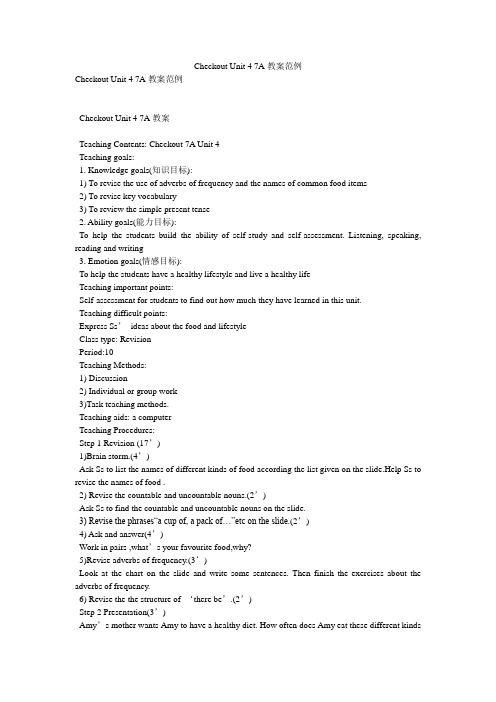
Checkout Unit 4 7A教案范例Checkout Unit 4 7A教案范例Checkout Unit 4 7A教案Teaching Contents: Checkout 7A Unit 4Teaching goals:1. Knowledge goals(知识目标):1) To revise the use of adverbs of frequency and the names of common food items2) To revise key vocabulary3) To review the simple present tense2. Ability goals(能力目标):To help the students build the ability of self-study and self-assessment. Listening, speaking, reading and writing3. Emotion goals(情感目标):To help the students have a healthy lifestyle and live a healthy lifeTeaching important points:Self-assessment for students to find out how much they have learned in this unit.Teaching difficult points:Express Ss’ideas about the food and lifestyleClass type: RevisionPeriod:10Teaching Methods:1) Discussion2) Individual or group work3)Task teaching methods.Teaching aids: a computerTeaching Procedures:Step 1 Revision (17’)1)Brain storm.(4’)Ask Ss to list the names of different kinds of food according the list given on the slide.Help Ss to revise the names of food .2) Revise the countable and uncountable nouns.(2’)Ask Ss to find the countable and uncountable nouns on the slide.3) Revise the phrases“a cup of, a pack of…”etc on the slide.(2’)4) Ask and answer(4’)Work in pairs ,what’s your favourite food,why?5)Revise adverbs of frequency.(3’)Look at the chart on the slide and write some sentences. Then finish the exercises about the adverbs of frequency.6) Revise the the structure of ‘there be’.(2’)Step 2 Presentation(3’)Amy’s mother wants Amy to have a healthy diet. How often does Amy eat these different kindsof food ? Look at her mother’s list and Amy’s diet chart on Page73 and complete the sentences belowAnswers:1.totamatoes 2.there are, 3.there is sometimes, 4.Are there any there are often, 5.here isalways usually, 6.Is there there isn’t often.Step 3 Practice(6’)Talk about your lifestyle accoring to the questions given.Step4 Guessing games(2’)Step5 Crossword Puzzle (2’)Step6 Discussion (8’)How can we keep fit?Step 7 Consolidation exercise (6’)Step 8 Summary(1’)Sum up the use of ‘there be’structure and adverbs of frequency.After teaching: 该课件内容是牛津7A Unit4 Check out.。
初中英语译林版教案设计7AUnit4

B: She usually gets up at 6:30.
A: When does Millie usually go to bed?
B: She usually goes to bed at 9:30.
2.Ask students to talk about their activities in a day in groups of four, and fill in the form on P43.
3 finish exercise B2
1).Work in pairs.Ask and answer about Millie's school life.
1 On what days does Millie go to school in a week?
2 When does their school start?
7When does Millie practise volleyball?
2).Students in role
Who wants to be Millie ans answer the other's questions?
Eg:How do you go to school everyday?
Where do you have lunch?
2. Tell your e-friend about your school life and complete a happiness chart for the E-friendship Club’s website.
Reflection
after teaching
牛津初中英语7A Unit4 Main task教案

课 题 Junior Oxford English 7A it 4 Food (Main Task) 课 型 Main Task
教 材 简 析
Junior Oxford English 7A (Fun With English). This is the main part of the unit. As we have learnt a lot about diet and lifestyle before hand, we are going to talk about “Healthy Eating” in this part. There is a table about the amount of calories and vitamins in a certain kind of food or drinks. The students need to read the table and get some information about healthy or unhealthy food. This will help them design a healthy diet later. This will also give them a general idea about the calories and vitamins that they take in every day. The textbook also offers a sample article from Millie. The students need to read the text and figure out the method of writing such articles. Then they can use the same method to write about their diets. (If possible, write more about the topic.) a. The topic of this part is “Healthy Eating” Students are to be motivated to talk about a healthy diet. They are going to learn how to talk about what they eat in a day. (Oral task should not be neglected.) b. Students may learn how to read about food and nutrition to develop the ability of reading for needed information. (Reading abilities.) The students are going to figure out the ways of writing such articles and try to write about their own diets. (Writing skills and abilities.) Overall, the students are hoped to have a healthy diet in the future and stay healthy. (Aims of morality.) There are a lot of vocabularies in the part. Help to clean the obstacles before we ask the students to finish the task. Deal with different vocabularies differently. We must create real-world tasks to get all the students involved. It is very important to make the students interested in the topic. Show the ways of reading the table to some weak students. (Most of the students may have no problem in doing this.) Students should be helped out when they have some problems in figuring out the outline of Millie’s article. Write the outline down on the blackboard. Write down some important sentence pattern also. e.g. It is important to do sth. The students write their own articles with the help of their own outlines. (For weak students, they can simply replace the underline words with their own information.)
7A unit4 (main task) 教学案

7A UNIT 4 FOOD(main task)课型:新授执笔:鲁河中学陈寿红审核:初一年级英语组一、教学目标:1,能看懂食物营养价值表。
2,将关于饮食和生活方式的信息用文章表达出来。
二、课前准备: (上课前预习一下课文,对你可有帮助啦,行动起来吧!)1, 大声认读下面的词,词组和句型吧!坚持用音标拼读,对照录音。
并了解它们的中文意思。
不会的请记录下来。
词:peanut, amount, calorie, vitamin, soup, without词组:keep fit, stay healthy, orange juice, green tea, start the day, rice with fish, have … for breakfast/lunch/supper/dinner, have soup, be good for, in water, withou getting fat.句型:I need vitamins to stay healthy.This helps me start the day . I sometimes have rice with fish and an apple for lunch . This meal gives me energy for the afternoon and for playing volleyball. It is also important to drink lots of water every day. You can drink it without getting fat.2, 看P71 PartA的食物营养价值表,记住食物名称,按Fruit,Vegetables,Meat,Drinks,Sweetsnack,Other food 分类,了解不同食物的calorie 和vitamin 含量。
听录音朗读。
3, 看P72 Part B,找出难点,听录音,跟读。
7A UNIT4 教学案第2课时

7A UNIT 4 FOOD(The second period:Reading A)课型:新授执笔:鲁河中学陈寿红审核:初一年级英语组一、教学目标:1、复习并扩展有关食物和生活方式的词汇。
2、学习饮食结构与身体健康之间的关系。
3、练习快速阅读了解总体大意,快速浏览查找细节的阅读技巧。
4,练习精读,理解掌握课文中的新语言点。
二、课前准备: (上课前预习一下课文,对你可有帮助啦,行动起来吧!)1,大声认读下面的词,词组和句型吧!坚持用音标拼读,对照录音。
并了解它们的中文意思。
不会的请记录下来。
词:dancer, diet,important,need,easy,tired,keep,fit,seldom,sweet,snack,Coke, between, meal, sugar(u), fruit(u or c), milk(u), bread(u), meat(u), study, top, lifestyle, basketball, fast, change, plan, juice(u)。
词组:get tired, keep fit, too much, fruit and vegetable s, top student, have healthy meals, eat … for breakfast/lunch/supper/dinner , plan to do sth. 。
句型:1、Every day, I dance for two hours. 2, A healthy diet is very important for a dancer. 3, I need lots of energy to dance. I need to keep fit. 4, It’s very easy for me to get tired. 5, I always eat an apple for breakfast. 6, I never do any exercise.2, 阅读P60课文,努力回答下列问题:(1)How long does Kitty dance every day?(2)How does she feel when she dances?(3)`What is important for her?(4)What does Kitty have for breakfast?(5)What does she have for dinner?(6)What does she have after dinner?(7)Does she eat any sweet snacks?(8)What does Daniel like doing?(9)Does Daniel have a healthy diet or lifestyle?(10)Can he run fast? Why?(11)What does he plan to do?3,听录音并跟读课文。
译林版英语77AUnit4 集体备课教案

课题7A Unit 4 Comic strip &Welcome to the unit 课型New教学目标1. To describe Eddie’s day;2. To ask and answer questions about Millie’s day;3. To use the new vocabulary to talk about the students’ own day.教学重点To use the new vocabulary to talk about the students’ own day教学难点To use the new vocabulary to talk about the students’ own day教学过程集体备课备课札记Step 1. Checking of preview work1. Check their preview work on their exercise books2. Solve questions they found about their preview workStep 2. Revision1.Revise how to express the time in English.2. Introduce oneselfStep 3. Presentation (Comic Stripes)1. Ask and answer, teaching “It’s time for English/ to havean English class.”2. Present Comic Stripes, introduce some new words andphrases like wake up, go to sleep, want to do sth.3. Guess what will Eddie do then? He doesn’t know how tohave fun.4. Listen to the tape and read, at last ,ask some pairs to act itout.Step 4.Welcome to the unit1. Ask and answer. Do you have fun in your school? Weoften have many different activities. We are happy. What doyou do every day? I get up at 6 a.m. …2. Look at Millie’s diary, read the new vocabulary.3. Look at Millie’s diary, fill in the blanks.4.Look at Millie’s diary, get the students to complete his/herday.Step5. Discussion1.Write out a time--table of yourselves, show it in your group.2.ask some to give a short talk about “My day”Step6. Read and practice1.Listen to the tape and read the dialogue after the tape.2.Work in pairs and talk about your school life.3.Present their work.Step7. Doing some additional exercises板书设计Unit 4 Comic strip &Welcome to the unit1.先做早操__________________2.对某人好____________________3.互相聊天___________________4.在操场上玩__________________5.课后练习___________________6.在星期三的下午______________7.最好的祝福_________________8.从星期六到星期天____________9.玩的开心___________________10.给某人写信_________________教学反思课题7A Unit 4 Reading (1) 课型New教学目标1. To identify specific information about school life and activities;2. To practice reading skills by learning Millie’s article;3.To learn the new words and expressions.教学重点1. To identify specific information about school life and activities;2. To practice reading skills by learning Millie’s article;教学难点To practice reading skills by learning Millie’s article教学过程集体备课备课札记Step 1. Checking of preview workStep 2. Revision1. Revise Millie’s day.2. Ask the students to talk about “My day”Step 3. Presentation1. Lead in--get the students to know the new words andphrases2. Listen to the tape and try to answer the questions.3. Listen and read, try to say which sentence is right andwhich one is wrong.Step4. Reading1. Read the passage and try to answer the questions.Who writes the e-mail? Who does she write to?What is the e-mail about?2. Do some T or F questions.3. Read the text and find out the main ideas: introduceherself and school about her class and friends/about thelessons/about the after-school activitiesStep 5. Retail the text with some key words or phrases.Step 6. Fill in the blanks.Millie is at Beijing Sunshine Secondary School. She is ____Class 1, Grade 7. She likes her classroom because it’s bigand ______.Amy is Millie’s _____friend.And they like ______ under the trees _____ _________. They always chat _____ ______or play______.Every morning they ____ ______ ________ first. Millie’s ________ lessons are Chinese and English, Every day Millie _______2 hours ______ her homework.Every Tuesday and Friday Millie goes the ______ _____. She sometimes _____ volleyball _____ Amy. Amy is a good ________. We have a good time at school.Step 7. DiscussionDiscuss their school life in groupsStep 8. SummeryStep9. ExercisesDo some exercises and check them in class.Step10. Homework板书设计Unit4 Reading1. 我们学校的一天从八点开始。
7A unit4(checkout) 教学案
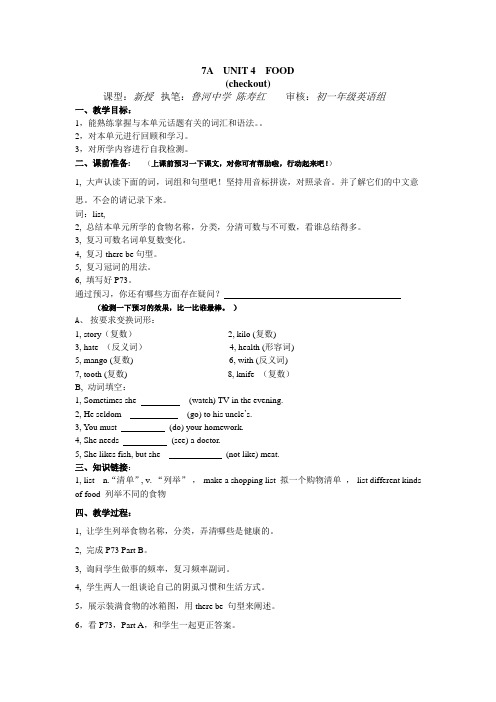
7A UNIT 4 FOOD(checkout)课型:新授执笔:鲁河中学陈寿红审核:初一年级英语组一、教学目标:1,能熟练掌握与本单元话题有关的词汇和语法。
2,对本单元进行回顾和学习。
3,对所学内容进行自我检测。
二、课前准备: (上课前预习一下课文,对你可有帮助啦,行动起来吧!)1, 大声认读下面的词,词组和句型吧!坚持用音标拼读,对照录音。
并了解它们的中文意思。
不会的请记录下来。
词:list,2, 总结本单元所学的食物名称,分类,分清可数与不可数,看谁总结得多。
3, 复习可数名词单复数变化。
4, 复习there be句型。
5, 复习冠词的用法。
6, 填写好P73。
通过预习,你还有哪些方面存在疑问?(检测一下预习的效果,比一比谁最棒。
)A、按要求变换词形:1, story(复数)2, kilo (复数)3, hate (反义词)4, health (形容词)5, mango (复数) 6, with (反义词)7, tooth (复数) 8, knife (复数)B, 动词填空:1, Sometimes she (watch) TV in the evening.2, He seldom (go) to his uncle’s.3, You must (do) your homework.4, She needs (see) a doctor.5, She likes fish, but she (not like) meat.三、知识链接:1, list n.“清单”, v. “列举”,make a shopping list 拟一个购物清单,list different kinds of food 列举不同的食物四、教学过程:1, 让学生列举食物名称,分类,弄清哪些是健康的。
2, 完成P73 Part B。
3, 询问学生做事的频率,复习频率副词。
4, 学生两人一组谈论自己的阴虱习惯和生活方式。
牛津译林版英语7AUnit4Reading(II)教学设计
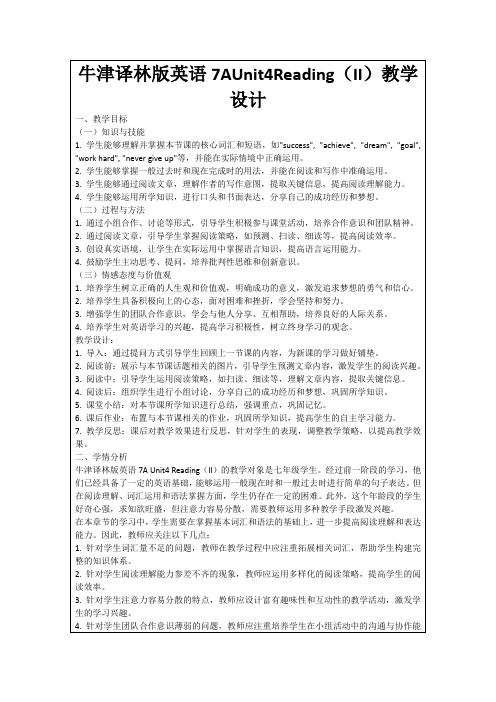
1.针对学生词汇量不足的问题,教师在教学过程中应注重拓展相关词汇,帮助学生构建完整的知识体系。
2.针对学生阅读理解能力参差不齐的现象,教师应运用多样化的阅读策略,提高学生的阅读效率。
3.针对学生注意力容易分散的特点,教师应设计富有趣味性和互动性的教学活动,激发学生的学习兴趣。
3.学生能够通过阅读文章,理解作者的写作意图,提取关键信息,提高阅读理解能力。
4.学生能够运用所学知识,进行口头和书面表达,分享自己的成功经历和梦想。
(二)过程与方法
1.通过小组合作、讨论等形式,引导学生积极参与课堂活动,培养合作意识和团队精神。
2.通过阅读文章,引导学生掌握阅读策略,如预测、扫读、细读等,提高阅读效率。
五、作业布置
为了巩固本章节的学习内容,确保学生对核心知识点的掌握,特布置以下作业:
1.写作练习:请学生撰写一篇关于自己梦想的短文,要求运用本节课学习的词汇和语法,如"success", "achieve", "dream", "goal", "work hard", "never give up"以及一般过去时和现在完成时。通过写作,让学生将理论知识与个人经历相结合,提高语言运用能力。
2. Can you share a successful experience of your own?
3. What is your dream and how do you plan to achieve it?
这些问题将自然引出本节课的主题,为学生接下来的学习做好情感上的准备。
7A UNIT4 教学案第7课时

7A UNIT 4 FOOD(The seventh period:Integrated skills A)课型:新授执笔:鲁河中学陈寿红审核:初一年级英语组一、教学目标:1,看懂调查问卷,写调查报告。
2,能通过阅读和听录音获取有关信息。
3, 了解关于某人生活方式的有关信息。
4, 了解健康和体育相关知识,确立正确的生活方式。
二、课前准备: (上课前预习一下课文,对你可有帮助啦,行动起来吧!)1, 大声认读下面的词,词组和句型吧!坚持用音标拼读,对照录音。
并了解它们的中文意思。
不会的请记录下来。
词:questionnaire, biscuit, point, congratulation, partner, overall,词组:less than, more than, three to six times a week, not…at all句型:How long do you sleep every night? How much TV do watch every day? How often do you exercise?2, 看P68 Part A1的调查问卷,听录音勾出Hu Wen的选择,再勾出自己的选择。
3, 根据Part A1的调查问卷完成Part A3,讨论一下下面句子。
4, 和搭档合作完成Part A4。
5, 完成Part A5。
通过预习,你还有哪些方面存在疑问?(检测一下预习的效果,比一比谁最棒。
)A、根据回答完成问句:1,-- do you do your homework every day?--Two hours.2, -- do you watch TV every ngght?--Twice a week3, -- students are there in your school?--About six hundred.4, -- rice can he eat?--Three bowls.B, 根据实际选择答案:1、How long are you away from school?A、Never away from school.B、Less than a week.C、About two weeks.D、More than two weeks.2、How often are you ill?A、Never.B、Sometimes.C、Often.D、Very often.3、How often do you get to school early?A、Never.B、Always.C、Sometimes.D、Usually.4、What time do you go to bed at night?A、Before 9:30.B、9:30—10:00.C、10:00—11:00.D、Later than eleven.5、How many hours of sport do you do every week?A、Six hours or more.B、About five hours.C、Three to six hours.D、Less than 3 hours.6、Do you eat a lot of fruit and vegetables?A、Often.B、Usually.C、Sometimes.D、Never.三、知识链接:1, how to keep fit “如何保持健康”,动词不定式前加了特殊疑问词,注意这不是句子。
牛津译林版七年上册 7A Unit4 教案

1、I ____at 6:30 p.m in the evening.
2、Peter _____at school at 11:40p.m.
3、They _____at 7:00 a.m.
4、Sally _____at4:35p.m.
5、Andy and I _____at9:00p.m.
2.It’s time for …,是一个固定结构,意为“是……的时候了”,可以与It’s time to do…结构进行转换。如:是好好休息的时候了。It’s timea good rest.= It’s timea good rest.而若要表示“是某人做…的时候了”,用It’s time for sb to do…
3)What does Hobo think of some dogs?
4)What do you think of Eddie, a hard-working dog or a lazy dog?
2.Listen and repeat afterthe tape.3. Act the dialogue.
---- No, ________
教后反思:
编号19主备人:王娟主备时间:10.14审核人:陈建芳
7AUnit4My dayComic strip & Welcome to the unit
复备栏
【教学目标】
1.介绍日常学习和生活的基本安排和活动。
2.对自己或他人的一天进行简单描述。
【教学内容】
1.预习生词及短语。
2.重点短语默写。
1.醒来_________2.出去_____3.吃早饭/午饭/晚饭__________________
牛津译林版英语7AUnit4ComicstripWelcometotheunit优秀教学案例
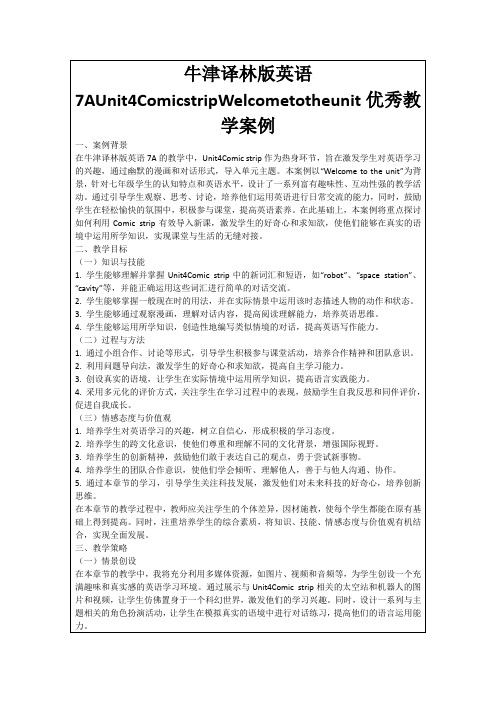
1.通过小组合作、讨论等形式,引导学生积极参与课堂活动,培养合作精神和团队意识。
2.利用问题导向法,激发学生的好奇心和求知欲,提高自主学习能力。
3.创设真实的语境,让学生在实际情境中运用所学知识,提高语言实践能力。
-学生通过例句和练习,掌握一般现在时的用法。
(三)学生小组讨论
1.将学生分成小组,让他们根据对话内容进行角色扮演,练习新学的词汇和句型。
-教师分配角色:“Now, please work in groups and act out the dialogue using the new words and phrases.”
4.采用多元化的评价方式,关注学生在学习过程中的表现,鼓励学生自我反思和同伴评价,促进自我成长。
(三)情感态度与价值观
1.培养学生对英语学习的兴趣,树立自信心,形成积极的学习态度。
2.培养学生的跨文化意识,使他们尊重和理解不同的文化背景,增强国际视野。
3.培养学生的创新精神,鼓励他们敢于表达自己的观点,勇于尝试新事物。
1.分组讨论,让学生在小组内分享观点,提高合作能力。
2.设计小组竞赛,激发学生的学习积极性,增强团队凝聚力。
3.小组展示,鼓励学生勇于表达,提高自信心。
(四)反思与评价
在教学过程中,我将关注学生的自我反思和同伴评价,帮助他们认识到自己的优点和不足,从而促进自我成长。
1.引导学生进行自我反思,总结学习过程中的收获和不足。
2.小组讨论如何创造性地编写类似情境的对话,展示小组合作成果。
-教师鼓励:“Try to create your own dialogue with the same topic. You can be as creative as possible!”
7A Unit4 School Life 教案

7A Unit4 School Life (Reading II) 教学简案Learning aims:1. Knowledge and ability:1.To understand the text2.To be able to use English to talk about school activities3.To grasp the usage of some important expressions2. Process and method:The Ss prepare for reading, speaking and writing. Encourage them to talk about their day.3. Emotion, attitude and values:Through the study on the expression of school life, cultivate the students’ love learning and take good care of the school emotion.Language focus:Encourage students to express themselves and talk about their day.Teaching procedures:1.Lead in: The teacher introduces herself.2.Warm- up activities:Answer some questions quickly.Ask students to make a dialogue.3.The competitions between Group A and Group B:①Recall the activities that Millie does at school (with the help of some pictures).②Read the text quickly and find out more phrases.△Ask students to write on the blackboard.△Explain some language points4.According to Millie’s school life, finish the short passage as quickly as possible..5.Read Sandy’s day and then answer some questions.6.The final competition: Talk about your day.7.Homework: Write an e-mail to your friend about your father’s day.。
7A unit4(Integrated skills A) 教学案
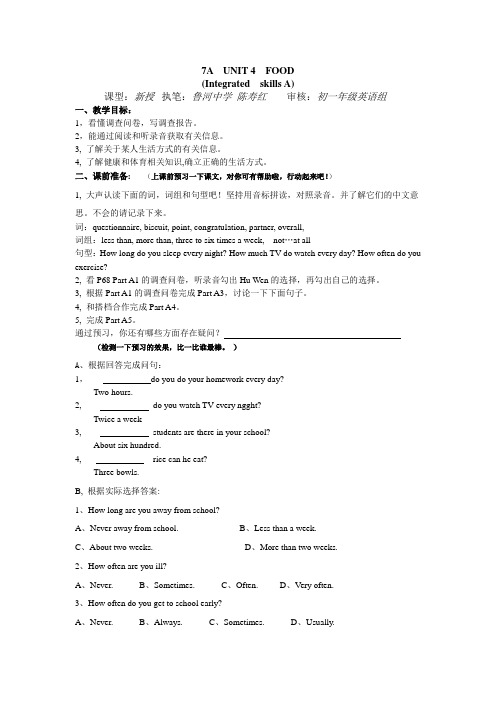
7A UNIT 4 FOOD(Integrated skills A)课型:新授执笔:鲁河中学陈寿红审核:初一年级英语组一、教学目标:1,看懂调查问卷,写调查报告。
2,能通过阅读和听录音获取有关信息。
3, 了解关于某人生活方式的有关信息。
4, 了解健康和体育相关知识,确立正确的生活方式。
二、课前准备: (上课前预习一下课文,对你可有帮助啦,行动起来吧!)1, 大声认读下面的词,词组和句型吧!坚持用音标拼读,对照录音。
并了解它们的中文意思。
不会的请记录下来。
词:questionnaire, biscuit, point, congratulation, partner, overall,词组:less than, more than, three to six times a week, not…at all句型:How long do you sleep every night? How much TV do watch every day? How often do you exercise?2, 看P68 Part A1的调查问卷,听录音勾出Hu Wen的选择,再勾出自己的选择。
3, 根据Part A1的调查问卷完成Part A3,讨论一下下面句子。
4, 和搭档合作完成Part A4。
5, 完成Part A5。
通过预习,你还有哪些方面存在疑问?(检测一下预习的效果,比一比谁最棒。
)A、根据回答完成问句:1,-- do you do your homework every day?--Two hours.2, -- do you watch TV every ngght?--Twice a week3, -- students are there in your school?--About six hundred.4, -- rice can he eat?--Three bowls.B, 根据实际选择答案:1、How long are you away from school?A、Never away from school.B、Less than a week.C、About two weeks.D、More than two weeks.2、How often are you ill?A、Never.B、Sometimes.C、Often.D、Very often.3、How often do you get to school early?A、Never.B、Always.C、Sometimes.D、Usually.4、What time do you go to bed at night?A、Before 9:30.B、9:30—10:00.C、10:00—11:00.D、Later than eleven.5、How many hours of sport do you do every week?A、Six hours or more.B、About five hours.C、Three to six hours.D、Less than 3 hours.6、Do you eat a lot of fruit and vegetables?A、Often.B、Usually.C、Sometimes.D、Never.三、知识链接:1, how to keep fit “如何保持健康”,动词不定式前加了特殊疑问词,注意这不是句子。
- 1、下载文档前请自行甄别文档内容的完整性,平台不提供额外的编辑、内容补充、找答案等附加服务。
- 2、"仅部分预览"的文档,不可在线预览部分如存在完整性等问题,可反馈申请退款(可完整预览的文档不适用该条件!)。
- 3、如文档侵犯您的权益,请联系客服反馈,我们会尽快为您处理(人工客服工作时间:9:00-18:30)。
总 课 题
2 课时
课 题
Reading1
课型
New
教学目标
知识目标
Vocabulary: chat, first, each, other, practice, wish
Phrases: in the morning/afternoon/evening, each other, have a good time, best wishes
2. Check learning paper.
The teacher introduce own daily activities.FromMondayToFriday. I’mneverlate forschool.In the morningI usually clean my officefirst. After school, I like to do after-school activities with my students. Sometimes Ichat withthem. They tell me lots of interesting things. All of ushave a good timeat our school.
Ask Ss to make up a dialogue like the model.
Consolidate what they have learnt in class.
Finish the exercises in the workbook.
Remember useful expressions.
教学过程
教学环节
教 师 活 动
学 生 活 动
复备
Step1
Revision
Step2
Retelling
Step3
Language
points
Step4
Showing
Step5
Exercise
Step6
Homework
Revise some useful expressions and have a dictation.
Picture4:
Millie is the best student in her class.
Ask: Who is the best student in your class? Why?
What do you need to learn from him/her?
Picture5:
Today is Teachers’ Day.Best wishesfor the teachers.
能力目标
Enable Ss to talk about their daily activities and their school life
情感目标
Cultivate Ss’ ability of arranging their daily life and their love for school life
教学重点
Talk about their daily activities in English.
教学难点
Talk about their daily activities in English.
课前预习
Preview the new words.
教学过程
教学环节
教 师 活 动
学 生 活 动
复备
Step1
Read the e-mail after the tape
sentence by sentence and then
fill in the blanks of B3.
Post-reading:
Talk about Millie’s activities in the school:
E.g. Do morning exercises
Read it fast andfind out the answer.
Read and finish some tasks.
Work in groups and then show out.
Practice in English.
Do exercises.
Do homework.
教学反思
总 课 题
初一年级英语学科教案
总 课 题
Unit4 My day
总课时
7
第 1 课时
课 题
Comic strip & Welcome to the unit
课型
New
教学目标
知识目标
Make Ss grasp the new words and phrases: wake up, seldom, go out, have fun, have lessons, activity, never, be late for, start, quarter, past
教学重点
Master the way of describing the school life.
教学难点
Master the way of describing the school life.
课前预习
Preview the new words.
教学过程
教学环节
教 师 活 动
学 生 活 动
复备
Step1
Ask Ss to read the dialogue after the tape.
Then ask them to read it in roles and ask some of them to act it out.
Millie is telling her aunt about her school life. Listen to their conversation and do some T/F questions. Milliegoes to school at 8:00. (F) They start lessons at a quarter past eight. (T) Millie enjoys school life very much. (T)
Step10
Homework
Show the four pictures of comic strip.
Do you remember our friend Eddie? Does he go to school? What does he do every day? Let’s listen to the tape and answer the two questions.
情感目标
Cultivate Ss’ love for their school life
教学重点
To master the usage of language points.
教学难点
To master the usage of language points.
课前预习
Read and try to retell.
Have lessons
Chat with friends
Play in the play ground
Go to the library
Read books in the Reading Club
Play volleyball
Let one of the students act the role of Millie. The other students can ask any question about her school. Eg: How many clubs do you have in your school? How do you go to school every day? Where do you have lunch?
能力目标
To enable students to get the general idea of Millie’s e-mail.
情感目标
To compare with Millie’s school life and love their own schools and school life.
Check
Step2
Presentation
Step3
Practice
Check answers of learning paper.
T: What time do you getup/ have breakfast/ go to school/ have lessons/ go home every day?
Show some pictures of clock.
Ask: What time is it?
It’s ……o’clock.
It’s time for …..
It’s time to do …..
Write the sentence on the blackboard.
Make up a dialogue like model: What time do you….every day? How long does it take? What about you?
What about you, boys and girls?
Pre-reading:
Go through the e-mail quickly and finish part B1 on page 45.
While-reading:
Read the e-mail carefully and do some T/F questions on page 45.
Do some exercises to consolidate
what they have learned in this
